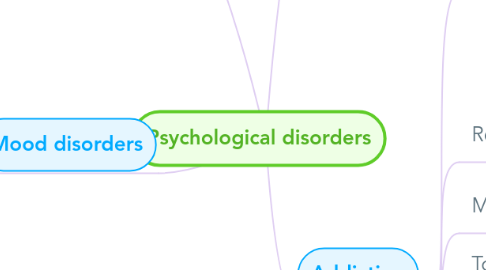
1. Mood disorders
1.1. Depression
1.1.1. Epigenetic: Gene controlling 5HT reuptake (short type): increased probability of depression with more stressful events
1.1.2. Less active left PFC, active right PFC in depressed people
1.1.3. Antidepressants
1.1.3.1. 1. Tricyclics (Tofranil): blocks reuptake of 5-HT, DA, NE -Also blocks histamine (sleepiness), ACh (dry mouth), Na+ (heart irregularities)
1.1.3.2. 2.SSRIs (Prozac): blocks 5-HT 3.SNRI (Effexor): blocks NE, 5-HT -Less side effects
1.1.3.3. 4. Monoamine oxidase inhibitors (MAOIs) (Nardil): prevents presynaptic degradation of 5HT, DA, NE (avoid tyramine, cheese bcz add= high blood pressure)
1.1.3.4. Antidepressants raises [BDNF] for learning
1.1.4. Electroconvulsive therapy (ECT)
1.2. Bipolar disorder
1.2.1. Bipolar I: mania with/without depression, common Bipolar II: hypomania with depression
1.2.2. Treatment
1.2.2.1. 1. Lithium
1.2.2.2. 2. Anticonvulsants milder form (Carbamazepine)
2. Autism
2.1. 12% of mothers with autistic kids have antibodies attacking certain brain proteins
3. Addiction
3.1. Drugs
3.1.1. Agonist drugs- enhance activity
3.1.2. Antagonist- inhibit
3.1.3. Mixed agonist-antagonist- modify
3.1.4. Affinity( tendency to bind to receptor) vs Efficacy (tendency to activate it)
3.2. Rewarding
3.2.1. Areas linked to DA or NE release in nucleus accumbens
3.3. More “want” than “like”
3.4. Tolerance(more amount to reach the same amount) vs withdrawal (unpleasant feeling of absence drug)
3.5. Nature vs nurture factors
3.5.1. Genetic
3.5.1.1. Dopamine receptor type 4 (long form): -less sensitive, more alcoholic cravings to compensate
3.5.2. Environmental
3.5.2.1. Type B/II alcoholism: genetic, early
3.5.2.2. Type A/I alcoholism: stress,gradual
3.6. Alcoholism treatment
3.6.1. Antabuse antagonizes enzyme = alcoholics associate drinking with toxicity
3.6.2. Naltrexone antagonizes opiates = decreased pleasure with drinking
4. Schizophrenia
4.1. Positive (abnormal additions) vs negative symptoms (abnormal absence)
4.2. Possible microdeletions of many genes: disrupts brain development, raises schizophrenia risk
4.3. Common in patients with older fathers
4.4. Season of birth effect: winter born have higher risk
4.5. Treatment
4.5.1. New antipsychotics (haloperidol): blocks DA
4.5.2. Glutamate schizophrenia hypothesis: -Deficient PFC glutamate activity (via NMDA receptors)
4.5.3. Prolonged use of antipsychotic drugs: - Tardive dyskinesia: slow, involuntary jaw/lip movement, tremors
